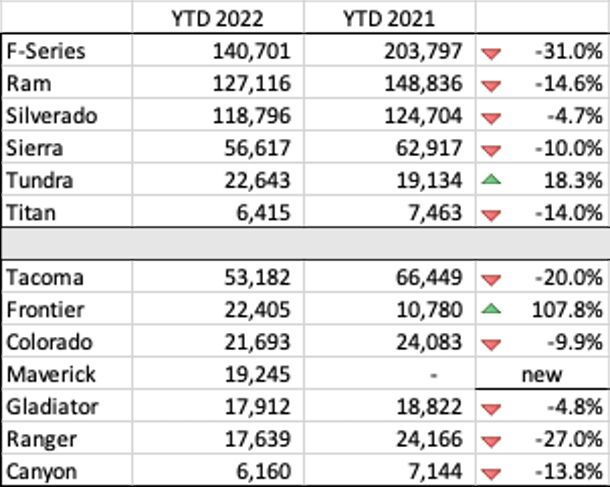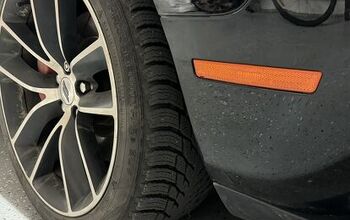Pickup Shake-Up: Supply Chain Headaches Stir the Pot

To say the first quarter of 2022 was a strange period for car sales would be to sorely understate the situation, akin to saying Vesuvius just barely covered Pompeii. Toyota kept its crown in America, models long out of production recorded sales, and GM beat Ford over the head in trucks.
Wait, what?
There’s no hiding the fact that just about every dealer has been severely impacted by the chip shortage, with plenty of room for tumbleweeds to blow around their empty lots. It’s certainly had the effect of creating a tremendously short turn time, one in which most rigs are sold very shortly after they roll off the truck, if not long before. Uneven production and delivery schedules have created some strange sales numbers, particularly in the red hot (and profitable) truck market.
See? While there’s no change in the overall pecking order for full-size pickups, take a gander at the vanishing delta between perennial top dog Ford and its competitors. Those of you who passed basic math can take a moment to sum up the total for GM’s duo versus the Blue Oval. For everyone else, we’ll tell you that Silverado/Sierra was 13,000ish units adrift of F-Series this time last year – the final quarter before everything hit the fan and production turned all topsy turvy timey wimey. In the bizarro world in which we currently find ourselves, they now outpace the king by about 35,000 units combined. Even if that has happened in the past, it’s always notable, kids.
Here’s a fun fact about truck sales numbers: Ford and Ram conveniently roll all its full-size pickups (1/2 ton and 3/4+ ton) into one report. GM chooses to break them down into Light Duty and Heavy Duty numbers for Silverado and Sierra, revealing that Heavy Duty trucks from Chevy and GMC comprised about one-third of sales for the S&S twins last quarter. In a headache-inducing bout of corporate acronyms, GM chooses to call its biggest trucks (those 4500+ Series chassis cab brutes) medium-duty pickups. The mind reels.
Other tidbits which can be parsed from this data include a robust showing for the new Frontier. We’re apt to compare its success against the achievements of its competitors in Q1 rather than blindly parroting the news that it doubled sales volume versus this same time in ‘21; remember, that was a transition year for the model. It’s also worth noting that the Maverick is handily outselling the Ranger so far in 2021.
Any other ruminations on these numbers from the peanut gallery? Sound off in the comments.
[Image: Ford]

Matthew buys, sells, fixes, & races cars. As a human index of auto & auction knowledge, he is fond of making money and offering loud opinions.
More by Matthew Guy
Latest Car Reviews
Read moreLatest Product Reviews
Read moreRecent Comments
- TheEndlessEnigma Hybrids and PHEVs make sense, EV's do not.
- Ajla My understanding is that the 5 and 7-Series cater almost exclusively to the Chinese market and they sell them here just so they don't look weak against Mercedes and Audi.
- EBFlex Interesting. We are told there is insatiable demand for EVs yet here is another major manufacturer pivoting away from EV manufacturing and going to hybrid. Did these manufacturers finally realize that the government lied to them and that consumers really don’t want EVs?
- Kwik_Shift_Pro4X What's worse than a Malibu?
- MaintenanceCosts The current Malibu is poorly packaged; there's far more room inside a Camry or Accord, even though the exterior footprint is similar. It doesn't have any standout attributes to balance out the poor packaging. I won't miss it. But it is regrettable that none of our US-based carmakers will be selling an ordinary sedan in their home market.



































Comments
Join the conversation
Lol...if you eliminate the normal Mustang and just count the Mach E...the Mustang still outsold the Camaro
And the Challenger outsold the Camaro. If I were picking from the 3 I would go with the Challenger with a bigger trunk and a roomier rear seat. Always liked the looks of the original 70 1/2 Challenger.